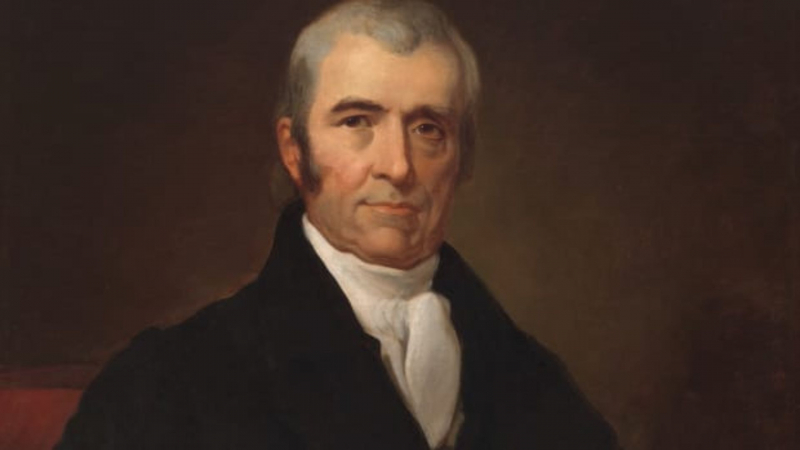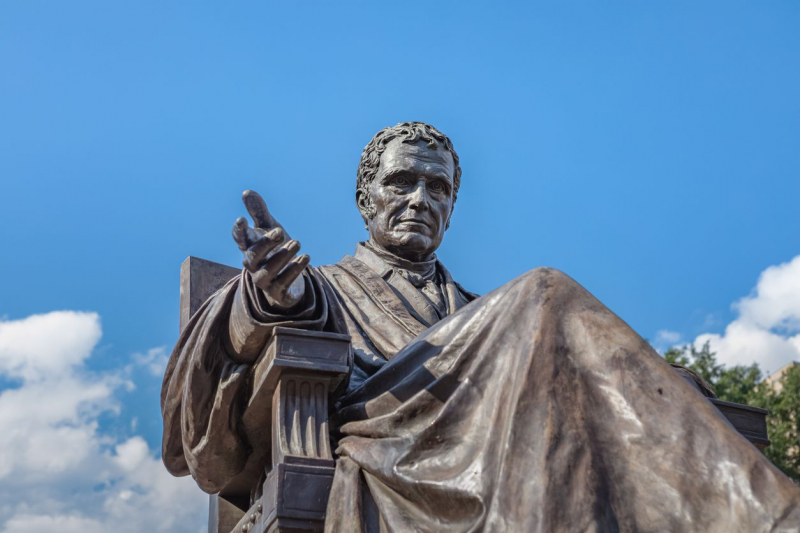John Marshall

John Marshall served as the fourth Chief Justice of the United States Supreme Court (1801-35). Marshall maintained the Supreme Court's authority to judge the validity of the nation's laws in Marbury v. Madison (1803) and other major cases and transformed the judicial branch into a powerful force in the U.S. government.
After leaving the army in 1780, Marshall attended William and Mary Law School, where he met his future wife, Mary Willis (Polly) Ambler, who lived in neighboring Yorktown. He was quickly licensed to the Virginia bar and established his own law firm, which grew as a result of his success defending clients against British creditors. He also began his political career, serving in the Virginia state legislature and working tirelessly to persuade Virginia to vote for ratification of the Constitution in 1789.
Despite turning down many government posts to stay in Richmond during Washington's two terms as president, Marshall developed as a powerful champion for the Federalist Party. The Federalists advocated for a strong national government, in contrast to the Democratic-Republican Party, which was led by Thomas Jefferson, a fellow Virginian, and Marshall's second cousin.
In 1797, as one of three US envoys tasked with resolving a developing crisis between the US and France, Marshall refused to pay the bribes demanded by French officials in order to talk. When President John Adams later disclosed messages from French officials, the ensuing XYZ Affair resulted in the Quasi-War with France.
Despite turning down many government posts to stay in Richmond during Washington's two terms as president, Marshall developed as a powerful champion for the Federalist Party. The Federalists advocated for a strong national government, in contrast to the Democratic-Republican Party, which was led by Thomas Jefferson, a fellow Virginian, and Marshall's second cousin.
In 1797, as one of three US envoys tasked with resolving a developing crisis between the US and France, Marshall refused to pay the bribes demanded by French officials in order to talk. When President John Adams later disclosed messages from French officials, the ensuing XYZ Affair resulted in the Quasi-War with France.
The Supreme Court had little jurisdiction in comparison to the president and Congress at the time; it didn't even have its own facility, instead meeting in a vacant committee chamber at the Capitol. However, during his 34-year tenure as Chief Justice, Marshall transformed the judicial branch into a force in governance equal to the president (executive branch) and Congress (legislative branch).
As a staunch Federalist, Marshall construed the US Constitution in a way that increased the federal government's power over the states. The Court's landmark decision in McCulloch v. Maryland (1819), which Marshall also wrote, established the idea that the Constitution gave Congress implied powers beyond those expressly enumerated in the document, including the power to establish a national bank that could not be taxed by individual states. In Cohens v. Virginia (1921), the Court affirmed its own right to review state court verdicts, so establishing federal supremacy over state courts.
Though the Federalist Party had completely disbanded by 1815, Marshall remained an advocate of the concept of a strong national government and a suitable opponent for Democratic-Republican political adversaries ranging from Jefferson to Andrew Jackson. During Marshall's tenure, the Supreme Court issued over 1,000 rulings, with Marshall writing more than half of them. Despite the fact that every justice selected during Marshall's term was appointed by a president who disagreed with Marshall's ideas, nearly all were unanimous, a credit to Marshall's strong leadership and ability to generate consensus
Marshall served on the Supreme Court during six presidential administrations, until his death on July 6, 1835, in Philadelphia, at the age of 79. Marshall, often regarded as the most influential jurist in American history, established the groundwork for the Supreme Court's role as the ultimate interpreter of the Constitution and prepared the way for the federal government's expansion in the nineteenth and twentieth centuries.


























